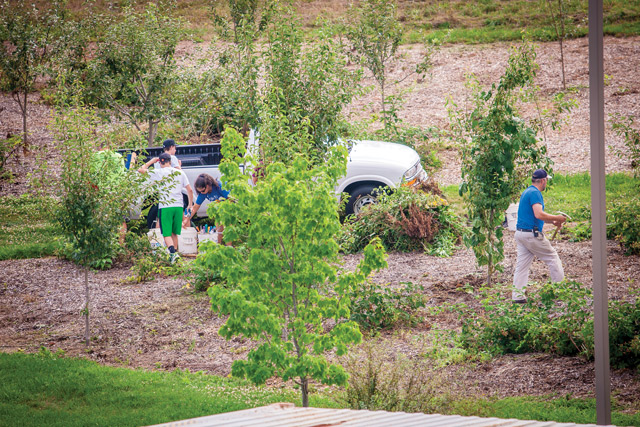From August to April, students are the life blood of EMU. After that, the faces on campus may be less familiar, but EMU’s heart keeps beating strong with summertime institutes and programs, sports camps, renovation and maintenance work, and groups who rent campus facilities.
Groundskeeping staff – including up to six full-time work-study students – continue to pull weeds, mow lawns, care for trees, plant flowers and edible landscaping, repair buildings, and perform general maintenance. In the words of grounds supervisor Will Hairston, “It’s not like the grass takes a break.” Work-study student Shay Whetzel says he enjoys getting to the end of the hard day’s work, then realizing he helped make the campus “look amazing.”
Dozens needed all summer
Other vital contributors include library staffers who take care of one of the best places to study, housekeeping crew members who make sure the facilities stay clean, and dining hall workers who take care of the people taking care of everything else. All these groups have student workers to help out while caring for each other, the campus, and the events that visit the campus.
Auxiliary services, with three full-time and eight work-study and/or temporary employees, handles the events that use the EMU campus by coordinating with leaders, communicating with various departments, setting up furniture for use, and making sure everything needed by a visiting group is available.
“We stay extremely busy over the summer,” says Lynn Veurink, assistant director for auxiliary services. Generally speaking, he says EMU hosts three kinds of large events, as well as a number of small events. The large events include church, youth, and athletic groups. Churches come to campus for meetings, retreats, and conferences. Youth groups come to worship and learn. Athletic groups come to practice and learn using EMU’s equipment and fields. Many of these events go on for days at a time, so visiting groups must use the dorms.
Running is big
The largest athletic event is Blue Ridge Running Camp, involving 40 to 50 coaches from NCAA Division I, II and III schools across the country. The biggest church group is Apostolic Eastern Camp, involving several Apostolic churches from across the Eastern United States and Canada. These two groups, with populations reaching several hundred each, run back to back.
Auxiliary services prepares for Apostolic Eastern Camp to fill every single dorm room for a week in July, and then spends the weekend afterwards preparing the rooms again for Blue Ridge Running Camp. This weekend might be the most stressful time on campus during the summer.
The largest youth event is a summer camp held by Lift Ministries, a Baptist group that involves several youth groups. This event runs early in July.
32 major events
The events calendar linked to the auxiliary services section of EMU’s website lists 32 major events running from the first of May to the ninth of August this year.
Outside of church, youth, and athletic events, EMU serves family reunions, wedding receptions, travelers, and other one-time events by renting out Lehman Auditorium, the gymnasium, dorm buildings, or other facilities. Some traveling groups simply need to use the dorms for one night, or some performing groups, such as Rockingham Ballet Theater, may need Lehman Auditorium for a few shows.
EMU serves Augusta County Public Schools by renting out the University Commons for the graduation ceremonies of four county high schools. Over the course of two days, 8,000-10,000 people pass through the Commons to attend these graduations.
EMU rolls on too
The main EMU-sponsored events after spring graduation ceremonies are the Summer Peacebuilding Institute, Summer Preparatory Music Program, the Shenandoah Valley Bach Festival, the Interfaith Peace Camp for children, Adult Degree Completion Program classes, and the Summer Institute for Spiritual Formation. This year, especially, construction workers are on campus, updating and remodeling the Suter Science Center and renovating Roselawn into office and classroom spaces.
Veurink points out that EMU hopping over the summer is “a matter of stewardship – by using your facilities you generate revenue.” If EMU didn’t invite others to use the campus, it would be wasting the potential of the campus. The revenues, which hit an all-time high gross of approximately $600,000 in 2012, says Veurink, support EMU’s general fund. More than that, many of these groups form intimate connections with the EMU community, as about 80% of the groups are returning groups. Veurink described the connection by saying that “they kind of become like family to us.”
